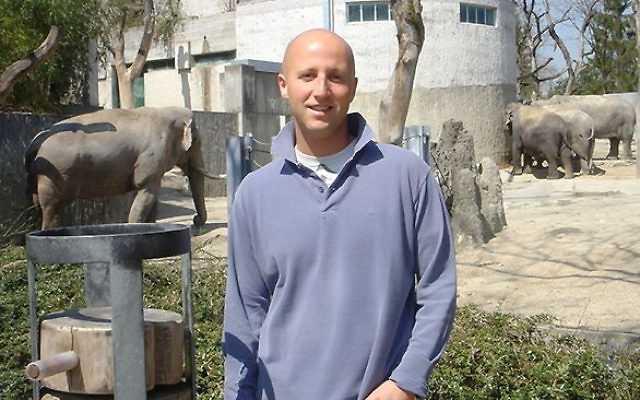New book uncovers Prisoner X secrets
A NEW book from Jewish journalist Rafael Epstein has shed light on the mystery surrounding Australian-born Mossad spy Ben Zygier, who was found hanging in his cell at Israel’s maximum security Ayalon prison in 2010.
Zygier was identified as Israel’s infamous “Prisoner X” in a report by ABC current affairs show Foreign Correspondent in 2013 sparking a media frenzy as journalists tried to make sense of the sensational story.
It was revealed Zygier had been enlisted by the Mossad after making aliyah in 2003 and worked as an operative for the Israeli spy agency in Europe, before he was arrested by Israeli authorities in 2010 and held at the country’s most secure prison, where his identity, the charges against him and details of his trial were suppressed as a matter of national security.
In the book Prisoner X, Epstein paints a picture of Zygier in his final years as a troubled soul, who suffered mood swings and displayed erratic behaviour. He writes that Zygier’s crimes appear to be precipitated more by hubris than high treason.
In March last year an article co-authored by journalists at German weekly Der Spiegel and Fairfax’s Jason Koutsoukis alleged that Zygier had failed in his mission as a Mossad plant in European companies with links to Iran, and tried to curry favour with his espionage bosses by attempting to recruit a Hezbollah operative as an informant for Israel. The article claimed Zygier gave the man names of top Israeli informants in Lebanon, information which was passed back to Hezbollah headquarters.
But Epstein claims Zygier “never met with anyone from Hezbollah”.
In the book, the 774 ABC Melbourne drive time host writes that Zygier unwittingly divulged highly sensitive information about operations targeting Iran to an “unscrupulous” Iranian businessman he was studying with at Monash University, after returning to Australia in 2009. Zygier had travelled to Iran in 2005 and 2006 and was a small, if integral, link in a chain of intelligence used to conduct surveillance on Iran’s nuclear program.
The information he passed to his classmate was relayed to Tehran, sparking an investigation into Zygier’s activities while in Europe and Iran. Crack Israeli intelligence-gathering body Unit 8200 intercepted Iranian correspondence about Zygier and summoned the wayward spy to Israel, where he was arrested and held by Shin Bet before being transferred to the infamous Cell 15 at Ayalon prison – the same cell built to hold Yitzhak Rabin’s assassin.
Epstein also disputes reports that Zygier was an incompetent operative. He contends that stories of his incompetence were allowed to circulate by Mossad to deflect from what Zygier knew about Iran.
Epstein also calls into question the conventional wisdom on the way in which Zygier was exposed to the world as a Mossad spy.
In 2009 Koutsoukis, then working as a Middle East correspondent for The Age, said he was tipped off by a source claiming to be an Australian intelligence officer that Zygier was spying for Israel – an extraordinary and inexplicable act for an agency that considered the Mossad to be its ally. In 2010 following the international incident in which Australian passports were used in the alleged Mossad hit on a Hamas arms dealer in Dubai, the government banished the Mossad man inside the Israeli embassy and the organisation has not had a presence in Canberra since. Epstein writes that a reason for this may be that someone inside the Rudd government and not ASIO outed Zygier to Koutsoukis as part of a strategy of “aggressively pursuing the Mossad” over anger about the use of Australian passports.
The book also details a large-scale surveillance operation undertaken by ASIO while Zygier was in Australia in 2009 to learn more about his misuse of Australian passports while spying for Israel. Epstein says a source revealed that Zygier had asked to borrow the passports of Australian friends in Israel in the mid 2000s.
But perhaps most disturbing are the passages detailing the calamitous mismanagement and bureaucratic bungling at Ayalon prison in the lead up to Zygier’s death.
Faulty cameras in Cell 15, a lack of communication between the spooks charged with keeping Zygier’s presence a secret and the prison officials tasked with caring for him, and the mishandling of the prisoner’s psychological issues created the “perfect storm”, according to Epstein. The day Zygier took his own life, his wife had visited him to ask for a divorce, something that led the former spy to spiral out of control. But Epstein offers that his suicide may have been a cry for help that was never meant to succeed. He wrote that Zygier may have thought it impossible to hang himself under the gaze of the cameras and constant scrutiny of the guards.
He also says Zygier should have had assistance from the Australian government at the time of his incarceration, but that his case was never discussed. Epstein writes that it is near impossible to believe ministers were unaware of Zygier’s arrest, given the intense scrutiny of Israel and the Mossad in the wake of the passport affair of 2010.
ADAM KAMIEN


comments